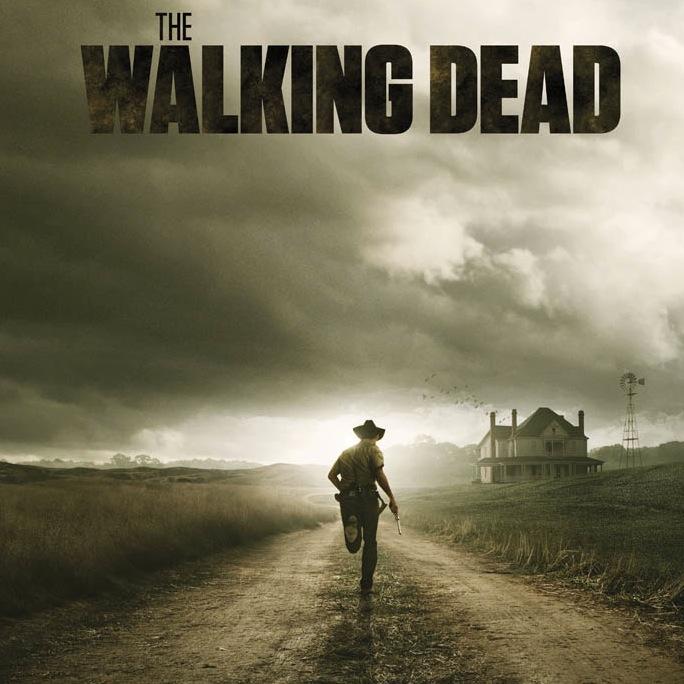The air is heavy with a silence broken only by distant birdsong and the buzzing of flies. A man clad in a sheriff ’s uniform and a wide-brimmed hat is the only moving thing in sight. He turns around at a scuffling noise behind him. Crouching down and looking under the wheels of a car, he watches a child’s hand lower into his field of vision to pick up a teddy bear on the ground. Standing, the sheriff sees the retreating back of a young girl, clad in a bathrobe, the teddy hanging from her loose fingers.
“Little girl?” he says tentatively, before adopting a more reassuring, authoritative tone. “I’m a police officer. Little girl.”
The little girl stops, and then turns around. She is a zombie; her mouth hangs limp and marred and her front is splattered with blood. Making hoarse gasping and snarling noises, the child zombie ambles forward, her target very clear.
“Oh god,” the sheriff whispers to himself in resigned horror. He pulls his gun and aims for the shortest moment—face grimacing—and then fires. A red cloud erupts from the child’s head as she falls back, teddy bear flung to one side, an oozing hole between her glazed eyes. The sheriff watches for a moment and then lowers his gun.
So began the first episode of season one of “The Walking Dead,” AMC’s zombie television series based upon the graphic novels of Robert Kirkman. Kirkman, who was an executive producer for the show’s first season and remains aboard for season two, commented about the pilot’s opening few minutes.
“This scene very quickly got rid of anybody who wasn’t going to wholeheartedly enjoy our show. We didn’t waste anyone’s time. If you didn’t like that scene, you could gladly change the channel,” said Kirkman.
If that scene didn’t convince people to change the channel, what fol- lowed after it certainly could have: a full hour of psychological terror, keen despair, and the delightful and self-exultantly gory disposal of many more “walkers.”
But people weren’t shocked off—quite the opposite. The premiere had 5.35 million viewers. By the finale of season one, there was an estimated more than six million who tuned in. “The Walking Dead” set a record as the most widely-watched series among adults ages 18-49 in the his- tory of basic cable. The show received immense critical acclaim, even being called the “best new show on TV” by Entertainment Weekly.
After only the second episode (which held ratings comparable with the premiere), a 13-episode second season was commissioned. While twice as long as the six-episode first, the second season, will be split into two halves, with the first six episodes in the fall and the latter seven in February.
This is where we now stand: On October 16, at 9PM/8C, the second season of “The Walking Dead” will begin with a 90-minute premiere. And, in the humble opinion of this reporter as based on preliminary data, the second season ought to be as good, if not better, than the first.
“The Walking Dead” never was, even in its first season, a show for the faint of heart. In fact, many times the show was preceded after commercial breaks by explicit warnings of its violence and intense nature.
“People who like zombie movies can sit down and watch this, and not feel like they are getting a light version of a zombie movie,” said Kirkman in the interview.
He hinted that the intensity of “The Walking Dead” would not fade with its second season—rather, that it would sink to even grittier, more dis- gustingly awesome levels.
“I can say, sitting here knowing what I know about the second sea- son, that you can’t even see the bar because it’s been raised so much,” said Kirkman. “There are all kinds of crazy stuff that is coming up. I’m really excited… [The producers] know that we can get away with the kind of things that we got away with on the first season. It really becomes just an effort to just find that thing that AMC is going to make us change.”
Another positive sign for the new season was AMC’s declaration that “there will be changes to the writing staff” of the show. While the show’s writing was not awful, it was often a little predictable and slightly unbelievable. An adjustment in writers hopefully means better dialogue. Another notable change is the replacement of show-runner Frank Darabont, who saw the first season through, with Glen Mazzara, a pro- ducer who wrote one of the episodes last season. Whether this will have any noticeable effect on the show remains to be seen. “The Walking Dead” season two looks as though it will be similar to season one in terms of violence and tone. Bearing that in mind, I repeat what I’ve already said—it isn’t up everyone’s alley. My basic mantra for the show is this: watch it if you enjoy drama that keeps you involved, liberally sprinkled with unabashed bloodshed and satisfying zombie-killings, and don’t watch it if you can’t tolerate or don’t enjoy extreme gore.
But I’m not one to be easily disturbed by violence; I found season one to be an enjoyable watch. I carry high hopes that season two will deliver the same.
The Walking Dead Season 2 premires October 16th on AMC.
Written by Aaron Newman. This article originally appeared in the September 2011 issue.



